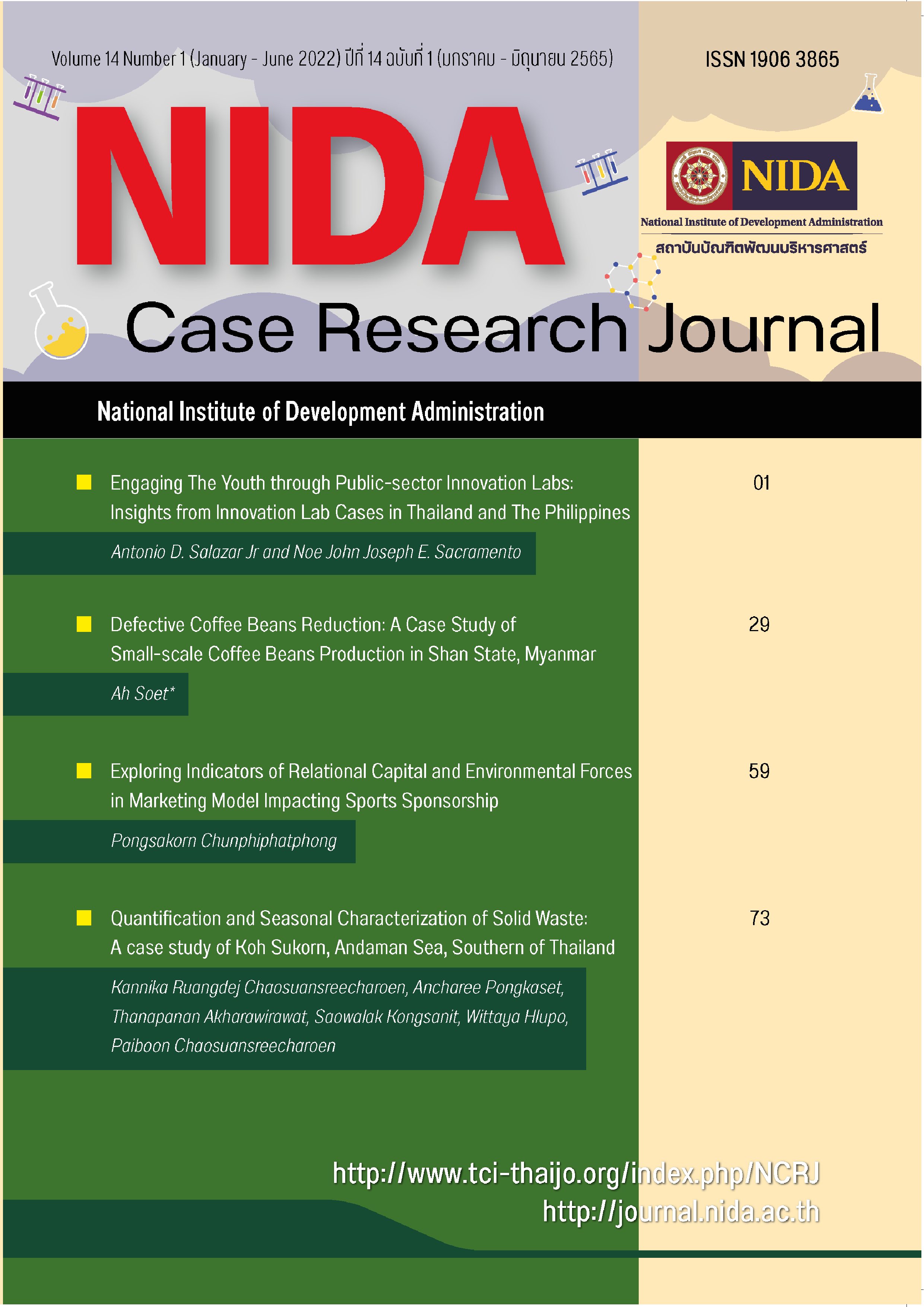Engaging the youth through public-sector innovation labs: Insights from Innovation Lab cases in Thailand and the Philippines
Keywords:
Philippines, Public Sector Innovation Labs, Public Policy, Thailand, Youth participationAbstract
This paper investigates youth participation in public sector innovation labs PSI Labs in Thailand and the Philippines specifically analyzing two cases—the Chiang Mai City Lab in Thailand and the Youth Social Innovation Lab (YSIL) in the Philippines. Public policy literature on PILs considers public innovation labs as a space and medium for co-design, co-learning, and co-implementation of policies. In Southeast Asia, PSI Labs have become a unique strategy in addressing social problems. Some of these PSI labs were designed to promote youth participation—digital natives who have the energy and the stakes to address concerns in the public sector. However, understanding how these spaces enable youth participation in engaging the public sector is limited. To address this gap in literature, this paper explored how the youth are engaged and empowered to participate in addressing public problems. Drawing from existing literature on youth involvement in policy processes, we scrutinized the Chiang Mai City Lab and YSIL, exploring how these innovation labs foster and leverage youth participation. Using lesson drawing as an analytical lens, we examined policy documents, program designs, and relevant secondary literature. Our findings reveal a diverse range of strategies employed to engage youth and integrate their perspectives in addressing public problems. The study also highlighted how digitalization played a crucial role in furthering youth participation. Overall, this research provides nuanced insights into the dynamics of public sector innovation labs, emphasizing their transformative potential as platforms for youth-driven policy development.
References
Bakırlıoğlu, Y., & McMahon, M. (2021). Co-learning for sustainable design: The case of a circular design collaborative project in Ireland. Journal of Cleaner Production, 279, 123474. https://doi.org/10.1016/j.jclepro.2020.123474
Boossabong, P., & Chamchong, P. (2023). Hope, fear and public policy: Towards empathetic policy process. Critical Policy Studies, 0(0), 1–19. https://doi.org/10.1080/19460171.2023.2247048
Brandsen, T., Steen, T., & Verschuere, B. (2018). Co-Production and Co-Creation: Engaging Citizens in Public Services (1st ed.). Routledge. https://doi.org/10.4324/9781315204956
Cairney, P. (2020). Understanding public policy: Theories and issues (2nd ed). Macmillan international higher education Red globe press.
Checkoway, B. (2011). What is youth participation? Children and Youth Services Review, 33(2), 340–345. https://doi.org/10.1016/j.childyouth.2010.09.017
Cole, L. (2022). A framework to conceptualize innovation purpose in public sector innovation labs. Policy Design and Practice, 5(2), 164–182. https://doi.org/10.1080/25741292.2021.2007619
De Vries, H., Bekkers, V., & Tummers, L. (2016). Innovation in the Public Sector: A Systematic Review and Future Research Agenda. Public Administration, 94(1), 146–166. https://doi.org/10.1111/padm.12209
Dunn, W. N. (2017). Public Policy Analysis: An Integrated Approach (6th ed.). Routledge. https://doi.org/10.4324/9781315181226
Forester, J. (1999). The deliberative practitioner: Encouraging participatory planning processes. MIT Press.
Frank, K. I. (2006). The Potential of Youth Participation in Planning. Journal of Planning Literature, 20(4), 351–371. https://doi.org/10.1177/0885412205286016
Gerston, L. N. (2014). Public Policy Making (0 ed.). Routledge. https://doi.org/10.4324/9781315701387
Gryszkiewicz, L., Lykourentzou, I., & Toivonen, T. (2016). Innovation Labs: Leveraging Openness for Radical Innovation? (SSRN Scholarly Paper 2556692). https://doi.org/10.2139/ssrn.2556692
Hartley, J. (2005). Innovation in Governance and Public Services: Past and Present. Public Money & Management, 25(1), 27–34. https://doi.org/10.1111/j.1467-9302.2005.00447.x
Horelli, L., & Kaaja, M. (2002). OPPORTUNITIES AND CONSTRAINTS OF ‘INTERNET-ASSISTED URBAN PLANNING’ WITH YOUNG PEOPLE. Journal of Environmental Psychology, 22(1–2), 191–200. https://doi.org/10.1006/jevp.2001.0246
James, O., & Lodge, M. (2003). The Limitations of ‘Policy Transfer’ and ‘Lesson Drawing’ for Public Policy Research. Political Studies Review, 1(2), 179–193. https://doi.org/10.1111/1478-9299.t01-1-00003
McGann, M., Blomkamp, E., & Lewis, J. M. (2018). The rise of public sector innovation labs: Experiments in design thinking for policy. Policy Sciences, 51(3), 249–267. https://doi.org/10.1007/s11077-018-9315-7
McGann, M., Wells, T., & Blomkamp, E. (2021). Innovation labs and co-production in public problem solving. Public Management Review, 23(2), 297–316. https://doi.org/10.1080/14719037.2019.1699946
Menny, M., Palgan, Y. V., & McCormick, K. (2018). Urban Living Labs and the Role of Users in Co-Creation. GAIA - Ecological Perspectives for Science and Society, 27(1), 68–77. https://doi.org/10.14512/gaia.27.S1.14
Mintrom, M., & Luetjens, J. (2016). Design Thinking in Policymaking Processes: Opportunities and Challenges: Design Thinking in Policymaking Processes. Australian Journal of Public Administration, 75(3), 391–402. https://doi.org/10.1111/1467-8500.12211
Pestoff, V. (2014). Collective Action and the Sustainability of Co-Production. Public Management Review, 16(3), 383–401. https://doi.org/10.1080/14719037.2013.841460
Ravetz, J., & Miles, I. D. (2016). Foresight in cities: On the possibility of a “strategic urban intelligence.” Foresight, 18(5), 469–490. https://doi.org/10.1108/FS-06-2015-0037
Rose, R. (1991). What is Lesson-Drawing? Journal of Public Policy, 11(1), 3–30. https://doi.org/10.1017/S0143814X00004918
Sacramento, N. J. J. E., & Boossabong, P. (2021). Technocratic and deliberative nexus in policy analysis: Learning from smart city planning in Chiang Mai, Thailand. Journal of Asian Public Policy, 1–17. https://doi.org/10.1080/17516234.2021.2007210
Satinitigan, K. (2014, August 23). Introducing innovation in the public sector: Experience from the Philippines. UN Global Pulse. https://www.unglobalpulse.org/2014/08/introducing-innovation-in-the-public-sector-experience-from-the-philippines/
Sillak, S., Borch, K., & Sperling, K. (2021). Assessing co-creation in strategic planning for urban energy transitions. Energy Research & Social Science, 74, 101952. https://doi.org/10.1016/j.erss.2021.101952
UNDP Philippines. (2019, November 21). Young Filipino Innovators Gather for UNDP Youth Social Innovation Lab. Retrieved from https://www.undp.org/philippines/press-releases/young-filipino-innovators-gather-undp-youth-social-innovation-lab
UNDP Philippines. (2021, February 2). Young Filipino Innovators Showcase Their Ideas for the Future at the Youth Social Innovation Lab 2020. Retrieved from https://www.undp.org/philippines/press-releases/young-filipino-innovators-showcase-their-ideas-future-youth-social-innovation-lab-2020
Xia, F., Yang, L. T., Wang, L., & Vinel, A. (2012). Internet of Things. International Journal of Communication Systems, 25(9), 1101–1102. https://doi.org/10.1002/dac.2417
Zivkovic, S. (2018). Systemic innovation labs: A lab for wicked problems. Social Enterprise Journal, 14(3), 348–366. https://doi.org/10.1108/SEJ-04-2018-0036
Downloads
Published
How to Cite
Issue
Section
License
Copyright (c) 2024 NIDA Case Research Journal

This work is licensed under a Creative Commons Attribution-NonCommercial-NoDerivatives 4.0 International License.





